The Jolly Corner
Some months ago, I was rereading Colm Toibin’s great first novel, The South, when I realized something about the way a voice is made—or maybe I would say forged. I’ve heard Colm talk in interviews about the silences in his family—the hush that fell over his home in (I believe) Enniscorthy, Ireland after his father died when he he was young. He talks about the way the unsaid reigned over his home, the way that much of what was important lay well on the nether side of speech. And you can hear that in the rhythm of his prose, even when he isn’t writing about Enniscorthy and the spaces in which he was raised. You can hear that hush, that sense of the unsaid as an “unmoved mover,” as the lost pater familias in command of the family. You can hear those empty hallways and that ghostly tonality.
I think also of Henry James’s story “The Jolly Corner,” which has been on my mind these many months when many of us have been (lucky enough to be!) barricaded in our homes. In this story—like The Turn of the Screw, haunted not so much by a ghost but by the possibility that it is in the end a ghost story—the main character returns to the New York City of his youth, after being gone for thirty-three years, to look at his family’s (all of whom are dead) two old properties, one of which is being renovated. His childhood home is located on “the jolly corner,” and I suppose it’s James’s thesis that it is only at our own jolly corners that we can struggle with grief and regret, disenchantment and the treachery of memory. (NB: I cribbed some of this synopsis from Wikipedia.) Like James himself, he finds the city materialistic and vulgar. Let me quote from Colm’s introduction to the New York Review of Books’s The New York Stories of Henry James:
In “The Jolly Corner,” written after his American sojourn of 1905, James found a new doubled self to dramatize, the man who had left New York and lived in England, and his double, still haunting him, who had never left, who still wandered in those same rooms which would fill James’s autobiography and had filled his novel “Washington Square.” … [Brydon, the main character] has kept his old house downtown empty all the years [he has been gone], having it cleaned and cared for every day. He now goes there to be haunted by a figure moving in its dark rooms, the figure who has never left them, just as James himself in part of his mind has never left them.
My thinking is that we are often, as we write, moving through these dark rooms, these jolly corners that we have long haunted. We are confronted by our doubles and must struggle with them—and not only in content, but in form, in voice. In my experience, the way that my family talked to each other, the kinds of conversations we had, the things that were spoken of and those that were not—the particular hushes, the specific silences and also excesses of saying—all of this informs my voice when I am writing authentically. I am haunted by the language of youth and home. Of course, in “The Jolly Corner,” the protagonist ends up physically fighting his double—for dominance over the jolly corner, for sovereignty over his own memories. For other still more difficult reasons, I’m sure. So when I write, what is the struggle? If, like James’s protagonist, I am fighting a shadow-self, what are we struggling over? What kind of terrain is at stake?
Collages on Shabbos
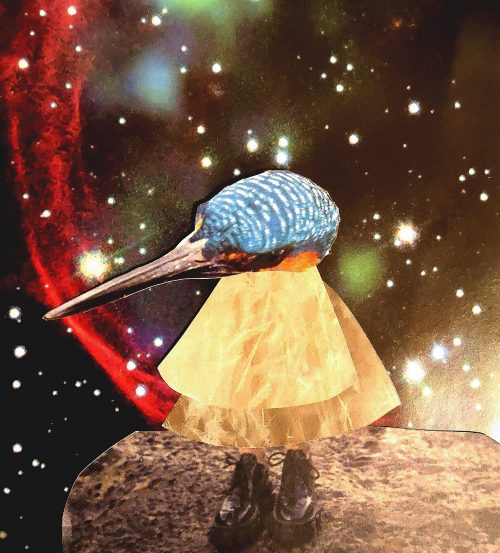
This is a series where I post collages people sent me just in time for Shabbos.
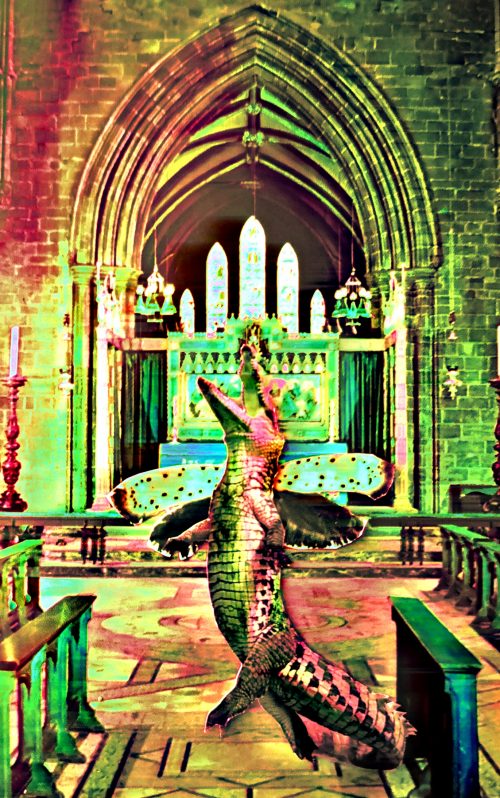
These collages are by Roz Leahy.
Roz is a hot, gay, trans woman. They try really hard to make interesting things and they’re on Twitter @allthingstruly.
If you want to send me a collage to post on a Shabbos to come, you can do so at collages::a:t::undying.club.
Michael on Movies: Meet the Blacks
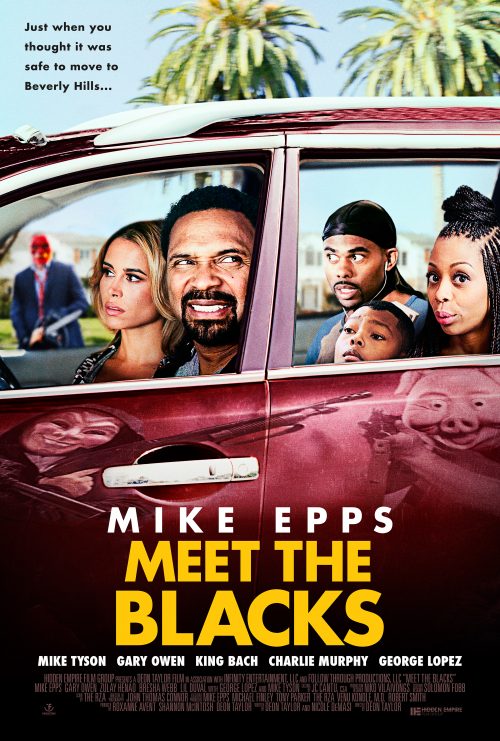
Surprisingly, very good (for something I thought would be very NOT good). There is so much behind-the-scenes stuff happening, it’s actually incredible, when you stop to think about it. So many people dismissed this movie when it first came out as just another spoof movie but, wait up! And look at this shit:
- Snoop Dogg appears in the first five seconds;
- You have Paul Mooney as Klansman #1;
- RZA does the music;
- Mike Tyson suddenly materialises as a character named James Clown (with full makeup and wig);
- Michael Blackson is Mr. Wooky (and it’s never really explained who the character is actually supposed to be or its purpose, in the world of Meet the Blacks);
- George Lopez is the president of the United States;
- And Charlie Murphy literally plays his heart out as a drug dealer fresh out of jail!
I could go on and on, here. Essentially, what I love most about this film is the zany world-building that takes place, which, in and of itself, already requires so much effort that it totally did not need to be in a film of this calibre, but here we are! Everyone and everything sort of follows the same internal logic (and if you can accept that, from the very beginning, you are going to looooove this film). That’s pretty much a guarantee.
I would describe it as a spoof of spoof films. So in the realm of spoof films, you have the OG: Airplane, and then Amazon Women On The Moon and The Kentucky Fried Movie (cause, why not?). Scary Movie comes along in the early 2000s to change the game, but before all that even, there’s Don’t Be a Menace to South Central While Drinking Your Juice in the Hood, Friday (which is less spoof and more, original comedy, but still worth mentioning), and then, Meet the Blacks. (I purposefully omitted the truly horrible examples, like Date Movie and Epic Movie because they don’t even exist, as far as I am concerned). It’s a very unique brand of lowbrow humour, here, and you have to go in knowing that. You think it’s catered toward a certain type of movie-going audience, but that’s just thinking inside of the box. Meet the Blacks actually tries so hard to be offensive (to everyone) that in the end, all of it is so silly and ridiculous, you’re going to laugh at half a dozen jokes (at least) even if you don’t think they’re funny, because it’s so absurd. It’ a nice exercise in finding out who you truly are. (Another good film for this is Edmond, 2005). I laughed at some jokes that on paper, I would have never laughed at. And there’s something to be said about Mike Epps’ delivery (and even though he is not a great actor, I appreciate his stage presence).
Overall, the spoofed-out parts are done brilliantly. There’s several bits where scary music is playing and you can hear the spooky echo of children laughing off in the distance (you know the sound effect) and then there’s the obligatory jump-scare–something a lot of shitty (recent) scary films do. Meet the Blacks wouldn’t be as good if we didn’t have so many terrible modern horror film tropes to harp on. And what’s brilliant is the writers absolutely know this (like full-on mad genius level) and take advantage of all of the inconsistencies that exist in what are essentially releases that are remakes of remakes, marketed as serious films.
I feel that Meet the Blacks is trying to say something–provide a message in the same way Get Out claims it was trying to provide a message. I am not sure I know what the message is, but I feel Meet the Blacks is way more sincere and open about what it is trying to say. There is an odd ambiance to the sound design too! In a few of the scenes, you will hear wind in the background, as the characters are talking and just existing, and this wind is something that was clearly added in post-production. It has no business being there, because it doesn’t add anything to any of the scenes, other than announce its presence. It’s actually pretty David Lynch, and it’s a bit strange, to see/hear in a film like this. It’s these small sort of if-you-aren’t-paying-attention-and-you’re-totally-dismissing-this-film-by-doing-another-sort-of-activity-like-folding-your-laundry… you’re not going to notice. And maybe that’s the point? Like a cool little unnecessary Easter Egg? (Aren’t all Easter eggs unnecessary?)
If you pretend this movie was made by someone you know and they made it over the course of an entire weekend and they didn’t have a lot of money to begin with, but for some reason felt they had a wholly unique vision and the only way to fulfill that vision was to make this film and now that the film is done, they really want you to watch it–this is that film. Meet the Blacks has some of the best use of wacky sound effects I have heard in a long while. Just as a quick aside, and to further cement my disdain (yet again) for many modern films… I would watch this over any of the Bourne films, again and again and again. Meet the Blacks breaks down all of the walls (whatever that means)–something I feel we need more than ever, especially right now, in our current socio-political-COVID-whatever environment/moment. This is a film that wants you to remember that it’s okay to sometimes laugh at something because it’s 100% stupid and doesn’t entirely make sense. ‘Cause life’s just life, y’know? Who gives a damn if you’re not making as much money as you think you should be making? Or that your dream publisher seems to just not want to ever publish you. Or that bad things keep happening in the world and that’s just never going to end. Stop living in the future and come back to the present. Enjoy the now and just slow down for a little bit, yeah? Breathe in. Cool. It’s Meet the Blacks. A high three out of five, from me.
September 4th, 2020 / 10:31 am
Mrs. Dalloway v. Ulysses
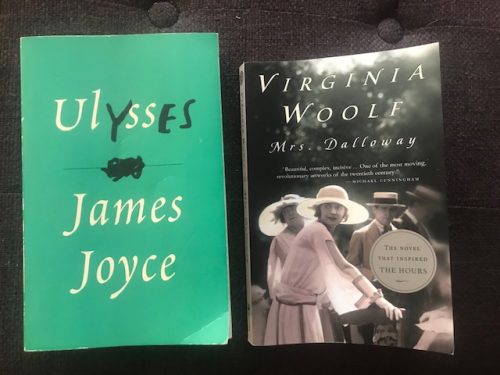
I recently reread Mrs. Dalloway and Ulysses. I read them when I was young, now I’m at the beginnings of becoming old.
Both books take place during one day, Mrs. Dalloway June 13, 1923, and Ulysses June 16, 1904.
Mrs. Dalloway feels like a day to me. I felt like I escaped into 1923, that I was really there, hanging out with Clarissa, Elizabeth, Peter and Septimus. Even though the characters are upper class, in another country, 100 years ago, far removed from my personal life experience; it still seems like Woolf captures many of the universals of life, throwing parties, shopping, having children, having a partner for a long time, having a person who you once loved, imperialism, having wars and PTSD veterans, being a wife of a PTSD veteran, sexuality and friendship. Basic experiences, we all have, regardless of social class or time.
I recently read The Waves and Orlando, sometimes when I am reading Woolf, I feel like I am having a mystical experience.
I am fascinated by the structure and arrangement of Ulysses. I get very zenned out when reading Ulysses, like I am in a dreamland, away from my life. It shows me personally that it is possible to supply information in multiple ways and the audience still gets a picture of what is happening.
I don’t feel like I am living a day in Dublin though, and I don’t feel like it contains many universals, it is just two guys walking around chatting with other guys all day. There is this scene that I guess is a nightmare hallucination, that stretches from 429 to 609, that is like, why?
I believe Joyce was a very rigorous, competent and hardworking fellow, however I don’t think he was very deep and had never taken the time for true self-examination, so trying to use two or three people, as symbols for what it means to be human, comes off, a little funny.
The sad thing, I get from both books, is that life in the early 20th century United Kingdom offered no spiritual path and mental health treatment (The treatment Septimus gets seems bad). These characters were eaten by their agonies. I am really happy we have invented self-care and have medications for mental issues.
I am glad I reread both books, in 15 years I’ll read them again.
If I Detransition I’d Still Be Fucking All Your Dads: from the Vimeo account of Joss Barton
I discovered Joss’s writing from Clutch Fleishmann and Torrey Peters talking about her work on essay daily. Lines like “She need mother’s milk! She need semen and salt and sick nations on her tongue!!” (from “Lord Be a Femme“) had me immediately. Reading them I was like, “Wow, I also need semen on my tongue. She really gets me.”
Joss’s writing is funny, dark and drips with the cadence of ball culture. She manages to be absolutely trans, absolutely the recipient of a voice that feels handed down across generations that fought to be heard. There’s a bite, a tenderness, a dense lyrical complexity. I find myself revisiting her work often, even years later.
At this point, six and a half years since I came out, most trans coming-of-age/coming-out stories kind of blur together for me. But Joss’s Untitled: Transgender Amphibian Femme Songs stands out: vulnerable and, as I have come to expect from Joss, totally horny on main. She talks about wanting to tell her dad, “If I had been given a choice, I would have asked to be born in another dimension, where sissies conquer planets and enslave nations of men hung like Sampson.” I can’t argue with that.
You can read Joss Barton’s most recent story at heartspark.
Go, Went, Gone without its beginning
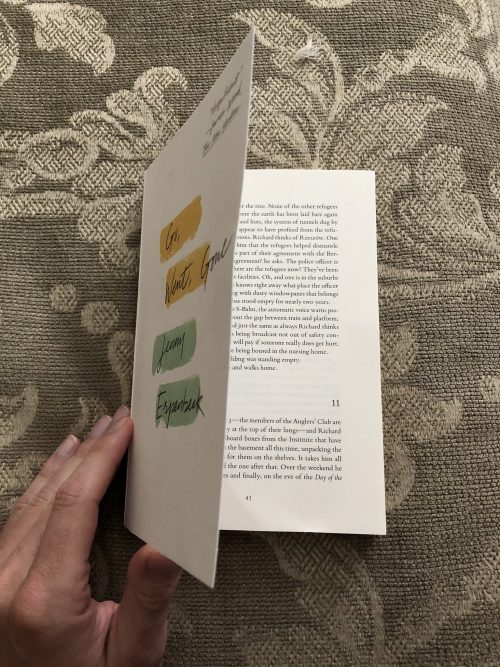
My copy of the latest novel by Jenny Erpenbeck—Go, Went, Gone—began immediately on page 41, leaving out the first 40 pages and legal copy, which at first I thought was a intentional feature of the narrative’s design. I’d already read several pages in the mindset of having been dropped Finnegans Wake-like into midsentence and midaction until I realized it was just a misprint, and still I liked the feeling caused by a novel kicking off with: “any interest in the woman or the tree,” which then led directly into the next and first full sentence: “None of the refugees is anywhere to be seen.”
It took me a while to find a site I could read the first 40 pages on for free and on the spot. When I did, I found the missing section seemed immensely different than the part I’d already read—and, really, even after having finished the novel, all the rest of it to come. The missing section somehow also seemed connected to my recent reality in an odd way—the protagonist is a classics professor whose wife has died, in the ongoing absence of which he’s forever in the midst of figuring out how to live his life alone, removed from all he ever knew. Without those 40 pages, the story otherwise felt quite differently marked—concerning a man without much background, who takes an interest in a group of refugees being held in stasis by the German government.
I think I enjoyed the language of the book and how it formed. It felt bizarre to think this copy was unlike any other copy of the novel, and that I owned it, that I might be the only person to have read it in the way that I had read, which is true of all reading, I think, but this time in a way that jarred my brain. I thought about returning it to the publisher for a correct copy, already read, but I also found that I enjoyed the ghostly presence of the absence of its context. I enjoyed imagining the other ways the text could have been changed, not by the author but by the machines that gave it shape long after the author had moved on; the many other ways the nature of the story would be changed depending on other kinds of error never seen, overriding the possible pleasure of the intended plot with a looming sense that nothing is sacred, and anything might yet be done. This would haunt me throughout the rest of the novel, like I’d been given a glimpse of some expanse behind a curtain and then instead forced to move into a labyrinth around the novel’s fleeting, hidden heart. I kept thinking of the intent of the author as different than the intent of the book object, and the world the object existed within; that is, mine. It might break down at any second, I kept thinking; I might turn the page and find something there no other reader could have found.
READ MORE >